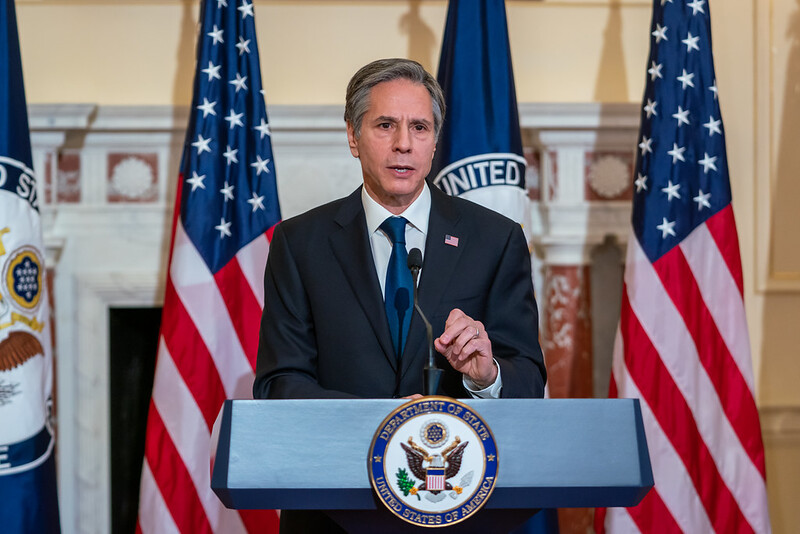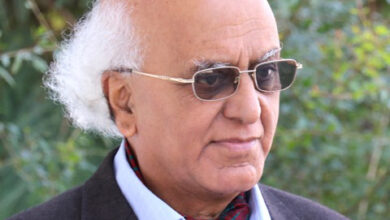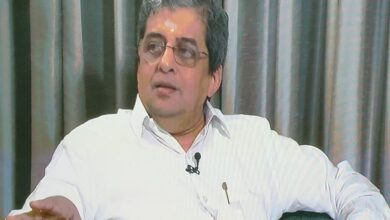Asserting Sovereignty, Bangladesh Must Condemn the US Visa Restrictions Policy
Some observers argue that the United States aims to foster a pro-US government in Bangladesh to facilitate agreements such as the Acquisition and Cross-Servicing Agreement (ACSA) and the General Security of Military Information Agreement (GSOMIA), among others.
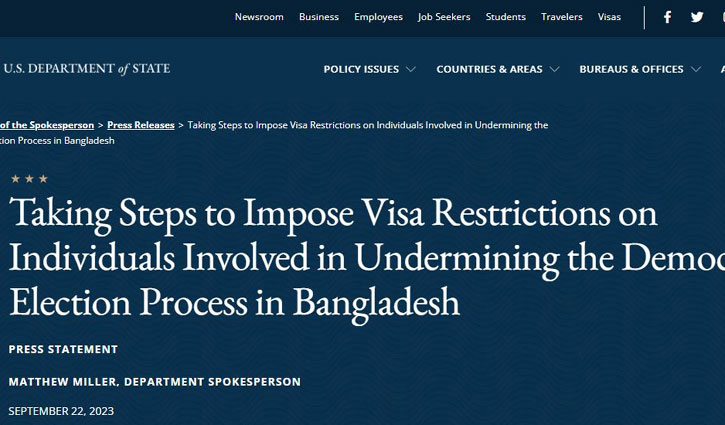
Introduction
Bangladesh, a nation that has earned its sovereignty through struggle and resilience, occupies a unique place in the Bay of Bengal. Its history is a fabric woven with diverse cultures, and its unwavering commitment to social justice has been a guiding light. However, it now confronts a significant challenge in the form of the United States’ visa restriction policy. This policy, which appears to advocate for free and fair elections, democracy, and human rights, conceals ulterior motives for interference in Bangladesh’s internal affairs. This article delves into the recommended course of action for Bangladesh in response to these external pressures. Concurrently, it strongly denounces the evident hypocrisy and double standards present in US foreign policy, particularly concerning democracy, elections, and human rights, as observed in its global actions.
Unveiling the US Visa Restriction Policy: A Wolf in Sheep’s Clothing
The United States, often recognized for its global influence, presents itself as a staunch advocate for democracy and human rights. While these principles hold immense value, it’s essential to scrutinize the underlying motivations guiding American actions. In the context of Bangladesh, the US visa restriction policy seems like a clear effort to exert undue influence by targeting key political and administrative figures and their families. Despite Washington’s claims that these restrictions aim to promote democracy and human rights, it’s vital to acknowledge that such policies encroach upon the sovereignty that nations like Bangladesh hold dear. It is also discrimination against the people of Bangladesh and a violation of Article 2 of the Universal Declaration of Human Rights (UDHR).
Some observers argue that the United States aims to foster a pro-US government in Bangladesh to facilitate agreements such as the Acquisition and Cross-Servicing Agreement (ACSA) and the General Security of Military Information Agreement (GSOMIA), among others. These agreements could potentially open the door for the deployment of military equipment, including the contentious possibility of nuclear assets, within Bangladesh’s borders. Such actions, seen by some as a way to exert strategic pressure on regional powers like India and China, raise significant concerns about Bangladesh’s sovereignty and its role in shaping regional security dynamics.
U.S. Secretary of State Antony Blinken speaks at a news conference as he announces that five Americans who had been jailed for years in Iran have been freed, in New York, U.S. Sept. 18, 2023. Craig Ruttle/Pool via REUTERS/File Photo.
The Glaring Hypocrisy: US Foreign Policy Elsewhere
When examining the United States’ foreign policy, particularly its rhetoric regarding democracy, elections, and human rights, a glaring inconsistency comes to light. While the US presents itself as a champion of these principles, its actions in various parts of the world reveal a disconcerting pattern of hypocrisy and double standards.
Firstly, the US has a track record of supporting autocratic regimes when they align with its geopolitical interests. Notable alliances with authoritarian governments in nations such as Saudi Arabia and Egypt exemplify this paradox, where the pursuit of strategic goals sometimes overshadows the promotion of democratic values. Secondly, allegations of election interference have been levelled at the US, with documented instances of such meddling occurring in other countries, including Russia, Ukraine, and even Bangladesh.
These actions raise questions about the sincerity of the US commitment to fair and transparent elections abroad. Furthermore, despite vocally condemning human rights abuses in other nations, the US itself has faced criticism and controversy regarding its treatment of detainees and minority communities, underscoring the inconsistency between its words and actions. Finally, the selective application of sanctions by the US further highlights this double standard, with certain countries facing severe punitive measures while others with comparable or worse human rights records remain unscathed. This glaring discrepancy is exemplified by the US response to Saudi Arabia’s actions in Yemen, revealing the opportunistic nature of its foreign policy decisions.
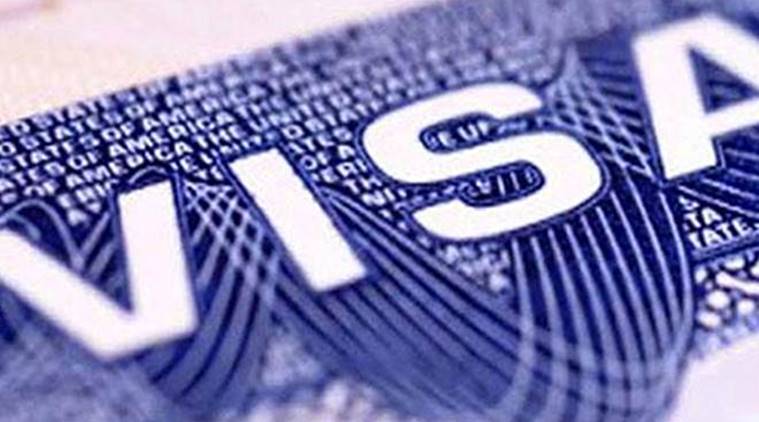
Sovereignty: The Cornerstone of Bangladesh’s Identity
Sovereignty forms the cornerstone of Bangladesh’s identity as an independent nation. It encompasses the inherent right to self-determination and the inviolable freedom to make decisions devoid of external coercion, both of which are at the core of Bangladesh’s existence. While Bangladesh wholeheartedly embraces constructive international engagement, the nation must steadfastly reject any attempts to manipulate its internal political dynamics.
In response to the US visa restrictions, which threaten to sow discord within the nation, Bangladesh needs to adopt a pragmatic and unwavering commitment to safeguarding its sovereignty and national interests. Here are several strategies that may guide Bangladesh’s approach to navigating this complex terrain:
Diplomacy: Bangladesh must maintain diplomatic channels with the United States, underscoring the nation’s dedication to preserving sovereignty while acknowledging the significance of diplomacy.
National Unity: Recognizing that internal divisions can be exploited by external forces, Bangladesh must emphasize national unity and consensus-building, particularly on matters of national security importance.
Global Solidarity: Seeking support from international platforms, such as the United Nations, is crucial for addressing concerns regarding sovereignty and external interference. A united front will be the strongest shield against coercion for Bangladesh.
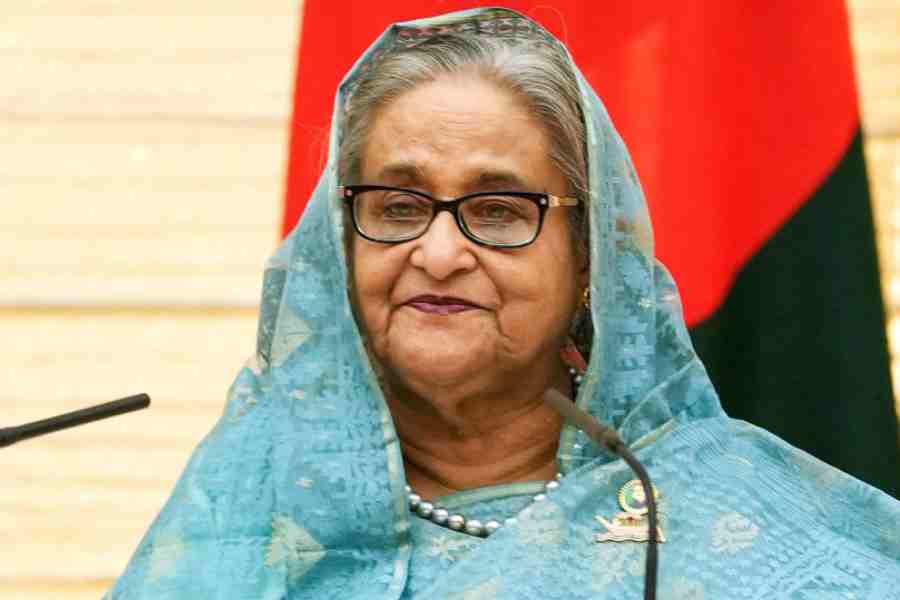
Public Diplomacy: Bangladesh must actively engage in public diplomacy to reveal the truth to the international community. Misinformation crumbles when confronted with incontrovertible facts.
Democracy: Bangladesh should do more to showcase its dedication to strengthening its own democratic values, institutions, and practises with transparency. By emphasizing the active involvement of its citizens, the country can effectively defend itself against accusations of authoritarianism.
Economic Self-Reliance: To enhance self-resilience, Bangladesh should prioritize reducing economic dependency on US dollars, US aid, and US investment. Policies that promote economic self-reliance and diversification are central to these efforts.
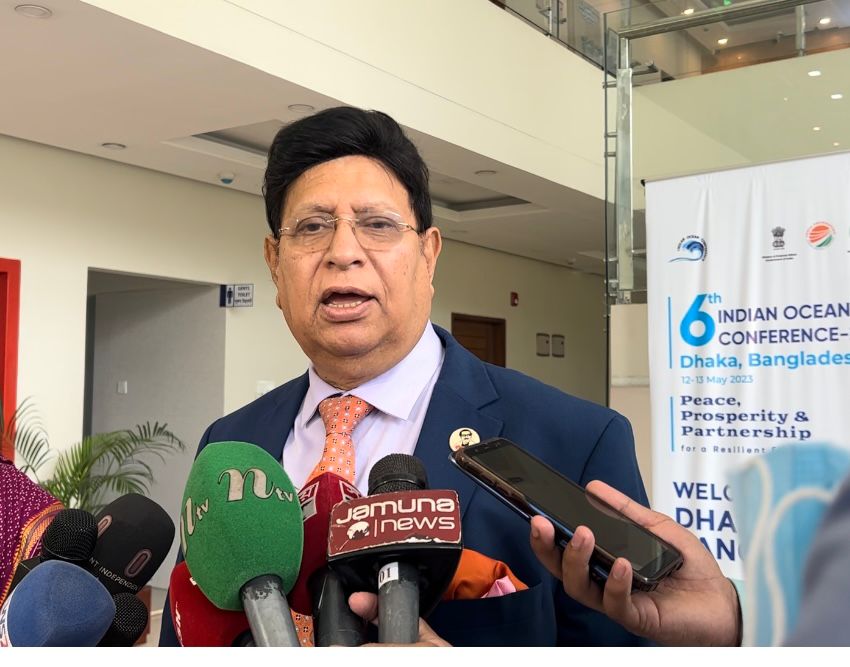
A Pragmatic Stand for Sovereignty
Bangladesh’s reaction to the US visa restriction policy must be marked by a pragmatic approach and an unwavering commitment to safeguarding its sovereignty. The potential of this policy to incite political turmoil within Bangladesh serves as a stark cautionary signal. Moreover, it falls upon us to hold the United States accountable for its blatant hypocrisy and the glaring double standards evident in its foreign policy.
To navigate this treacherous path while remaining true to the values and principles as a sovereign nation in the Bay of Bengal, Bangladesh may employ a multifaceted strategy. This strategy involves maintaining open diplomatic channels, fostering transparency, fortifying democratic foundations, and promoting economic self-reliance. These collective efforts will reinforce resilience, ensuring that Bangladesh remains resolute and unshaken in the face of external interference. This steadfastness paves the way for a future in which Bangladesh stands free from undue influence, firmly rooted in its sovereign identity.
Rajeev Ahmed
Geopolitical Analyst, Strategic Thinker and Editor at geopolits.com

